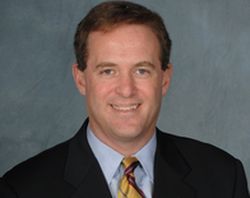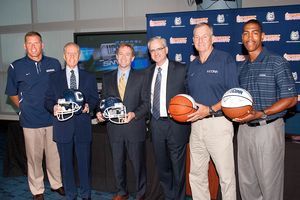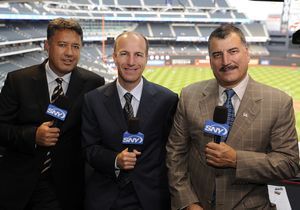Q&A: SNY President Steve Raab
Since 2008, Steve Raab has served as president of SNY, the regional sports network home to the New York Mets, owned by club-affiliated Sterling Enterprises, Time Warner Cable and Comcast. He succeeded Jon Litner, who now runs the regional sports network and golf businesses for Comcast/NBCU. In a recent interview with Multichannel News online editor Mike Reynolds, Raab looks back at the RSN's development, assesses the impact of the evolving Big East Conference, the prospects for the Tim Tebow Show, and what the future holds for the service and the Mets net. An edited transcript follows.
Multichannel News: You're five years in now. How have your expectations played out?
Steve Raab: SNY has been on the air for six years. It doesn't matter who the president is for the first 12 months, versus where the network is at 72 months. There's an evolution of RSN, to some degree of maturity. At the outset, a network is still trying to figure out its programming, its talent, its building blocks. After six years, the programming on the RSN should be right, operating at the right expense levels, the talent has developed and matured, whether it's the same group or not. There have been programming improvements.
The team is in a very different place than a few years ago. When SNY launched, the team was on the cusp, they had just made a lot of investments in the club. There have been changes. That's the great thing about sports. It's the ultimate reality show.
There have been challenges over all six years. There has been media skepticism about the level of objectivity. If there were ever an ownership group that might have wanted to backpedal...there has never been a word.
Even on SportsNite, which is an opinion show...there has never been a call. There is an expectation for us to be fair and accurate. But there has never been a call to tone it down, or be slanted. Never once. That's pretty amazing.
MCN: Viewers, for the most part, have stayed with the Mets?

SR: Certainly during the first half of the season, the core fans are there. However, the second half sizes up, certain core fans stick, and some fall off. If you step up, some join on...
Going back to the start, if the Mets had been a World Series team, at that time, we would have missed opportunities, not been able to capitalize...
MCN: Because the building blocks weren't in place...
SR: The building blocks to maximize the quality of content, to cover it from all angles, to sell it appropriately. We definitely had challenges, from a production perspective, from sales and programming standpoints. We were learning to do things in a challenging environment, to be creative and think outside the box. Now that the network has grown up, we'll be better in position, up and down, when the team is going in the right direction.
MCN: What about the other programming? Mets games only run from April to October...
SR: As we look to other programming pillars, the [New York] Jets have evolved for us. Initially, we were happy to be the home of Jets; we did the requisite amount of shoulder programming. But over time, our goal was to provide a closer look at the Jets, to work closely with the team. We certainly were the first to get cameras inside closed door lockers. We've done a lot of things with Jets, to gets us in closer, to give the viewers more access. That visibility has been good for the Jets and our network.
MCN: I watched Tim Tebow's introductory press conference on SNY. Can he fill 20 hours a week?
SR: (Laughs). What if Tim Tebow is the back-up quarterback?
Multichannel Newsletter
The smarter way to stay on top of the multichannel video marketplace. Sign up below.
MCN: Yes, but he's a marketing dream, a polarizing character, who might complete 45% of his passes, but still sells jerseys...
SR: If he's the backup quarterback, he's probably not going to sell that many jerseys. If he's not the [starting] quarterback, I'm not quite sure what the Tim Tebow Show is. Now the Mark Sanchez and Tim Tebow Show, could be pretty interesting. It came up during a senior staff meeting.
MCN: How about Hard Knocks with Tebow and Sanchez?
SR: We'd love to.... But I don't' know if an RSN could justify a Hard Knocks. HBO and NFL Films did a great job with the Jets two years ago. They set the bar pretty high. But the Sanchez-Tebow show could be very interesting.
MCN: How important is the Big East Conference to SNY?
SR: There used to be a few big East few games here and there [on the RSNs]. We're the one who pulled it together, to create that winter anchor, with over 100 live Big East Football and basketball games.
There was an opportunity with UConn. They are that state's 'professional' team. We have a separate network feed for programming that's of special interest in the state, which serves Connecticut viewers.
MCN: You have complete distribution coverage in the state of Connecticut...
SR: Right. It's a win for us, a win for UConn, a win for distributors and a win for fans. There are 100 hours of UConn programming they would never have had. We show football, men's basketball, soccer. Currently, we don't have the rights to women's basketball, but we have programming around [women's basketball coach] Geno [Auriemma].

MCN:Can you get the women's rights?
SR: We've put in an RFP; we're competing for it. [Public broadcaster] CPTV has had the games for 18 years and it's been a great partner with UConn. But we think we bring something else to the table.
MCN: The Big East is realigning in different directions with Syracuse and Pitt leaving in 2014.That has impact on SNY's territory...
SR: Some important schools for us in this market [are leaving] the Big East, and the schools coming in aren't as relevant to our territory. The Big East has been a great partner for us. I'm not sure with the teams leaving for the ACC that are relevant to us, what the RSN media deals are. RSNs have multiple pro and winter teams, we're the only ones who can in the winter, really give your school, conference, a level of commitment that's pretty unprecedented. That's not only because we don't have pro team, but because we have huge footprint and resources that include full news and studio operations. We want to wrap our arms around the teams. We're uniquely positioned.
MCN: Dish Network doesn't carry any New York-area RSNs. Any chance of getting back on Dish's air?
SR: Dish never carried YES. They stopped carrying MSG, before our deal was up [last year]. We thought we provided tremendous value to Dish, particularly considering that in our 9-million home territory, a lot of Dish homes are outside the New York DMA. A large portion of their homes are in upstate New York and Connecticut, places where we have deep college commitments, where we thought we delivered great value to them.
I'm they don't want to be in sports in this market, I'm not sure what we can do.
MCN: Your carriage deals are staggered?
SR: We're in good shape. If there were something coming, I'd probably try to dodge the question. (Laughs) But we don't. Launches are always a little hairy, but we've had a low of renewals come up and they're done. We keep moving forward
Even with Cablevision. YES had that terrible battle. Cablevision was not happy the Mets parted ways [with MSG Network],
MCN: You didn't get shout out the first season.
SR: We didn't get shut out even for the first game. Cablevision has been a good partner. We moved our network origination out to the Rainbow [now AMC Networks] facility in Bethpage. Technically, [Cablevision and AMC] they are not the same company...But they've been good partners.
MCN: How are ad sales going into the season, given that many don't have high expectations for the Mets?
SR: Business has been pretty good...One of our first markers is by Opening Day, that we want to be at 70% to 80% of our ad sales goal. We'll be there and at the high end of that range.
MCN: A lot of renewals?
SR: In this business, the renewal base is sizable. If you're not doing a good job, you don't get the renewals. If you're doing something wrong, whatever it is, you're not going to bring on a lot of new sponsors.
MCN: Are Mets corporate sponsors required to commit to SNY buys in some, all cases?
SR: The SNY and Mets sales forces were integrated two years ago. We go in as one, with integrated packages. It's not that we're looking to get double, but what is most effective. In some cases, it doesn't make sense. But more times than not, we can exchange ideas that sponsors, with a presence at Citi Field, can extend on-air. And those that want to be on-air can extend in the ballpark. The packages are more compelling that way and we're incented to sell as a whole, and not sell pieces. Or worse yet, sell against each other.
MCN: Are you looking for a good 2012 season for the Mets?
SR: I'm certainly not prepared to throw in the towel. I think that on the optimistic side, Johan Santana comes back. He doesn't win 20, but is effective. John Niese is better than what's he been and has a good year. Third starter A.J. Dickey will do well. If Dillion Gee is the fourth starter that's okay. Mike Pelfrey? We'll see.
Their bullpen is improved. First baseman Ike Davis, who missed most of last season, is back. We can put wager on it. Davis and [rightfielder] Lucas Duda will hit more than 40 home runs between them.

MCN: The shorter dimensions will add excitement at Citi Field?
SR: I think it will work to their advantage. Teams come in for one series and see the giant ballpark, it's okay. Over 81 [home] games, it gets in your head. I think it will help the guys. They're going to play really hard. [Manager] Terry [Collins] will have them play the right way. People may be surprised, but I think they can compete this year... I see building blocks, they're putting pieces in place to win in a sustainable way.
Win or lose, though, I'll take our broadcast team [Gary Cohen, Ron Darling and Keith Hernandez] any day. They're engaging, entertaining. They will educate you in some way, give you something interesting. I'll put them up against anybody.
